IntegrityStar, October 2021 edition
January 1, 2020, to December 31, 2020
During the 2020 calendar year, the UCF IntegrityLine received a total of 608 reports, a significant increase (223%) from the 188 reports submitted in 2019. Reports to the IntegrityLine have increased overall by 1,927% since the reporting tool became available in 2014.

The significant increase in reporting is most likely attributed to the increased marketing of the IntegrityLine reporting option and two major events that occurred during 2020: COVID-19 and allegations involving a faculty member. Of the 608 reports submitted in 2020, 605 contained allegations of suspected misconduct or ethical concerns and three reports were inquiries. Reports containing allegations of misconduct were triaged between University Compliance, Ethics, and Risk and University Audit. Based on the nature of the report, it was either investigated by University Compliance, Ethics, and Risk, University Audit, the Office of Institutional Equity, or referred to the appropriate compliance partner for review. Reports involving students under the UCF Golden Rule were referred to the Office of Student Rights and Responsibilities and reports criminal in nature were referred to the UCF Police Department.
Issue Type
Reports submitted to the UCF IntegrityLine in 2020 spanned a range of 20 issue types.
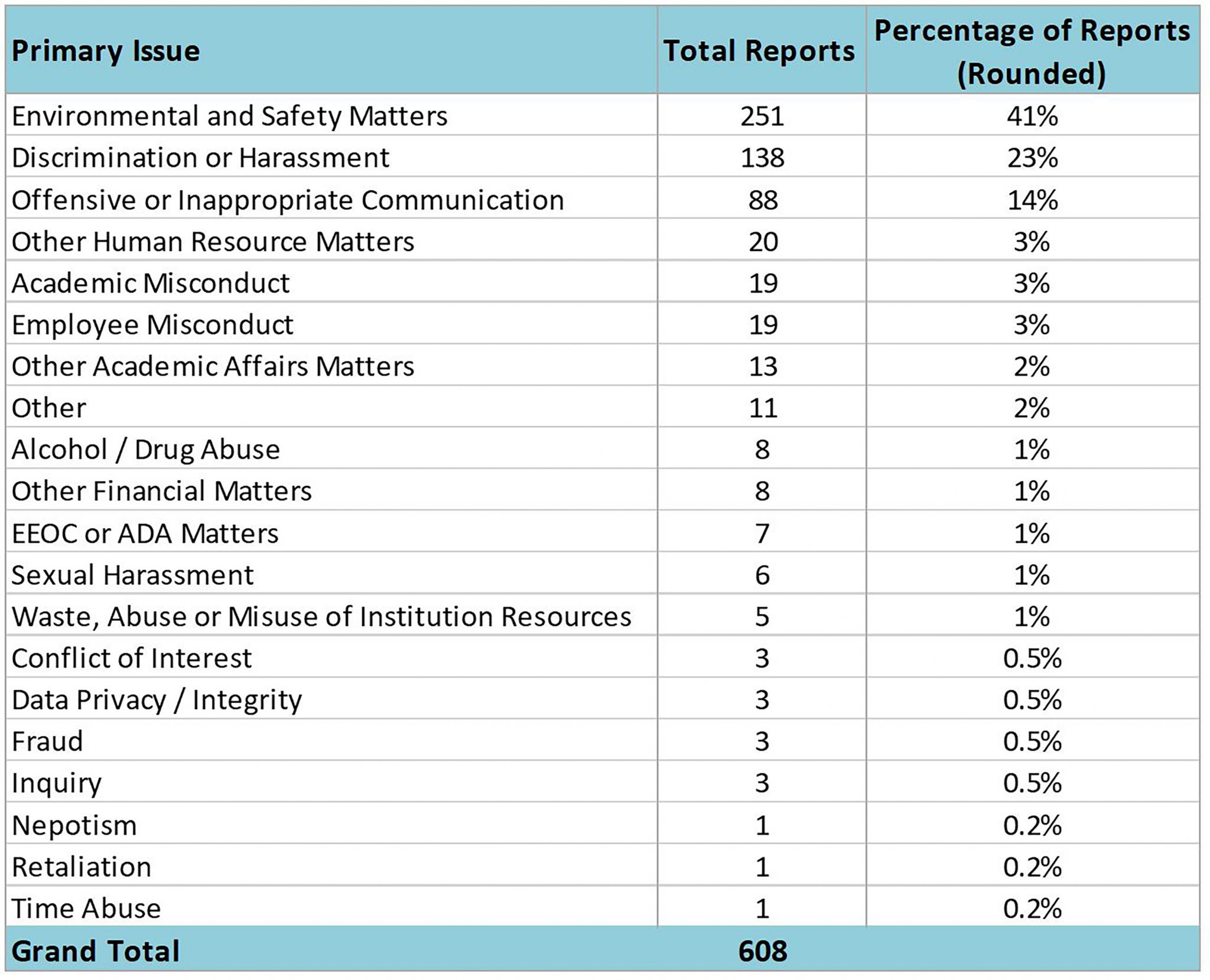
Environmental and Safety Matters
The highest number of reports in a single-issue type were categorized as Environmental and Safety Matters with 251 reports representing 41% of all reports submitted. This issue type includes any concern regarding health and safety and includes all COVID-19 related concerns submitted during 2020.
Discrimination or Harassment
With 138 reports, representing 23% of all reports submitted, the second highest reported issue type was Discrimination or Harassment. These reports involve allegations of non-compliance with UCF 2-004 Prohibition of Discrimination, Harassment and Related Interpersonal Violence Policy, which includes but is not limited to uninvited and unwelcome verbal or physical conduct directed at an employee because of his or her sex, religion, ethnicity or beliefs.
Offensive or Inappropriate Communication
The third highest number of reports made to the IntegrityLine in 2020 were categorized as Offensive or Inappropriate Communication with 88 reports representing 14% of all reports submitted. This issue type includes concerns related to inflammatory, derogatory, unduly critical or insulting communication and failure to treat one another with respect in accordance with the UCF Ethical Standards outlined in the UCF Employee Code of Conduct.
Closed Cases
University Compliance, Ethics, and Risk closed 453 IntegrityLine cases during the 2020 calendar year, a significant increase (150%) from the 181 cases closed in 2019. Closed cases include a combination of reports received in 2020 as well as those submitted in a previous year. Below are the outcomes for all cases closed in 2020.
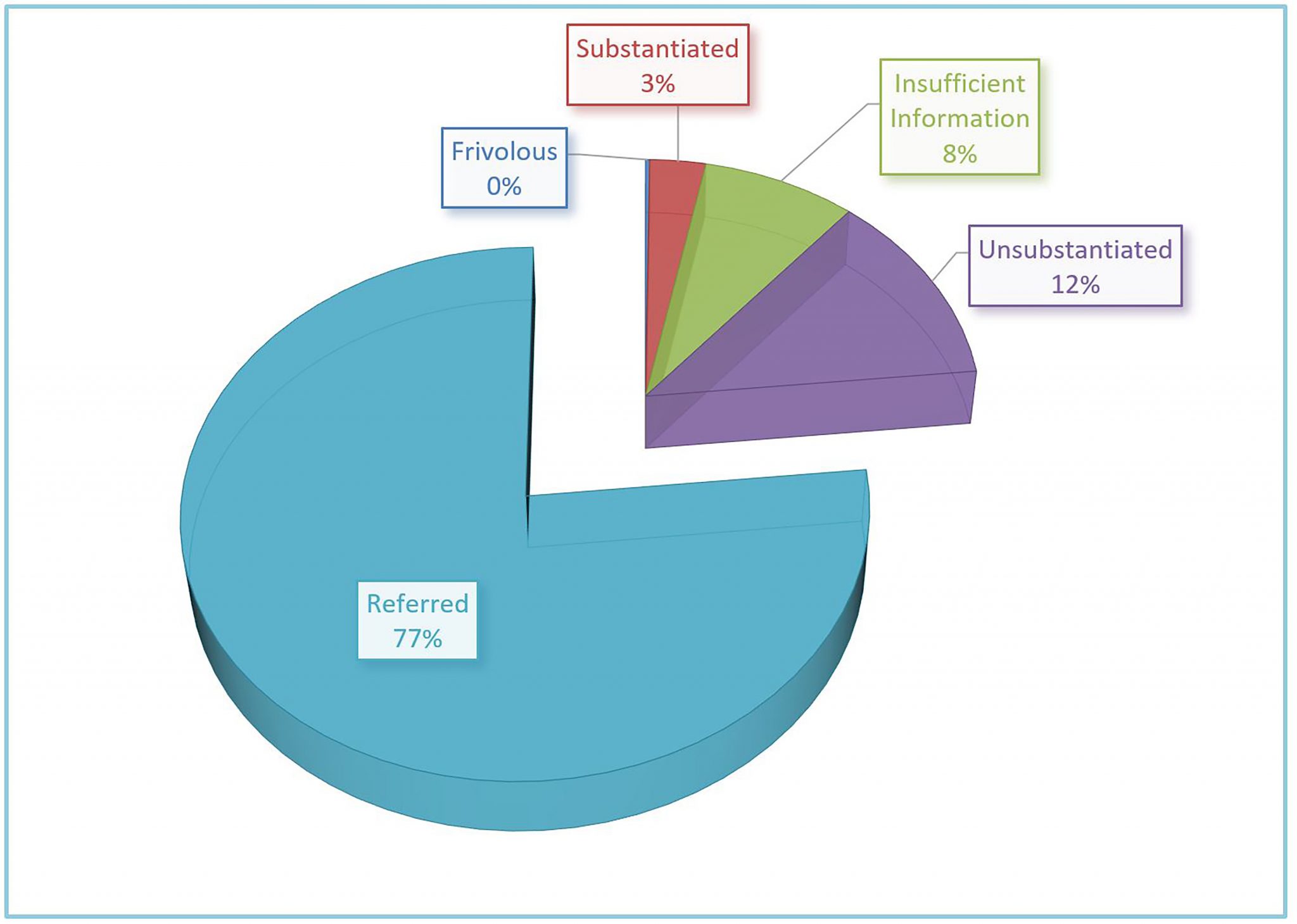

Closed Cases – Investigations with Substantiated and Unsubstantiated Findings
In 2020, a total of 69 of the 453 cases were closed after an investigation was conducted by University Compliance, Ethics, and Risk, University Audit, or the Office of Institutional Equity, with the following outcomes:
Substantiated Cases
Thirteen investigations resulted in a substantiated finding (representing 3% of all closed cases) where investigations yielded evidence to support the complaint and a finding that misconduct occurred. The substantiated cases spanned a range of topics, with the highest in the categories of Offensive or Inappropriate Communication and Employee Misconduct at 23% each.
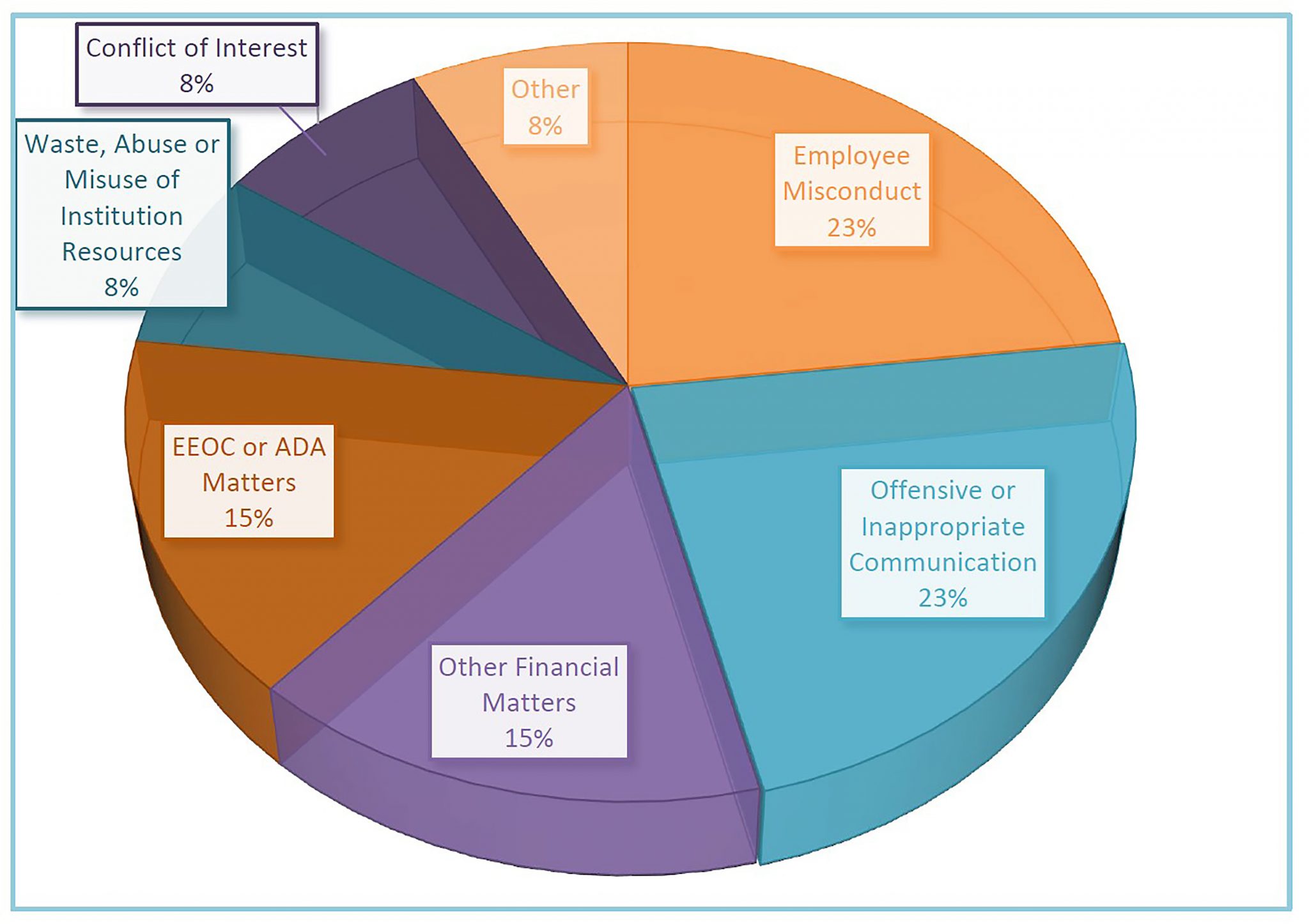

Substantiated Cases – Action Taken
For the 13 investigations that resulted in substantiated findings, the university took the appropriate action. Those actions included policy / process reviews, disciplinary action and termination.
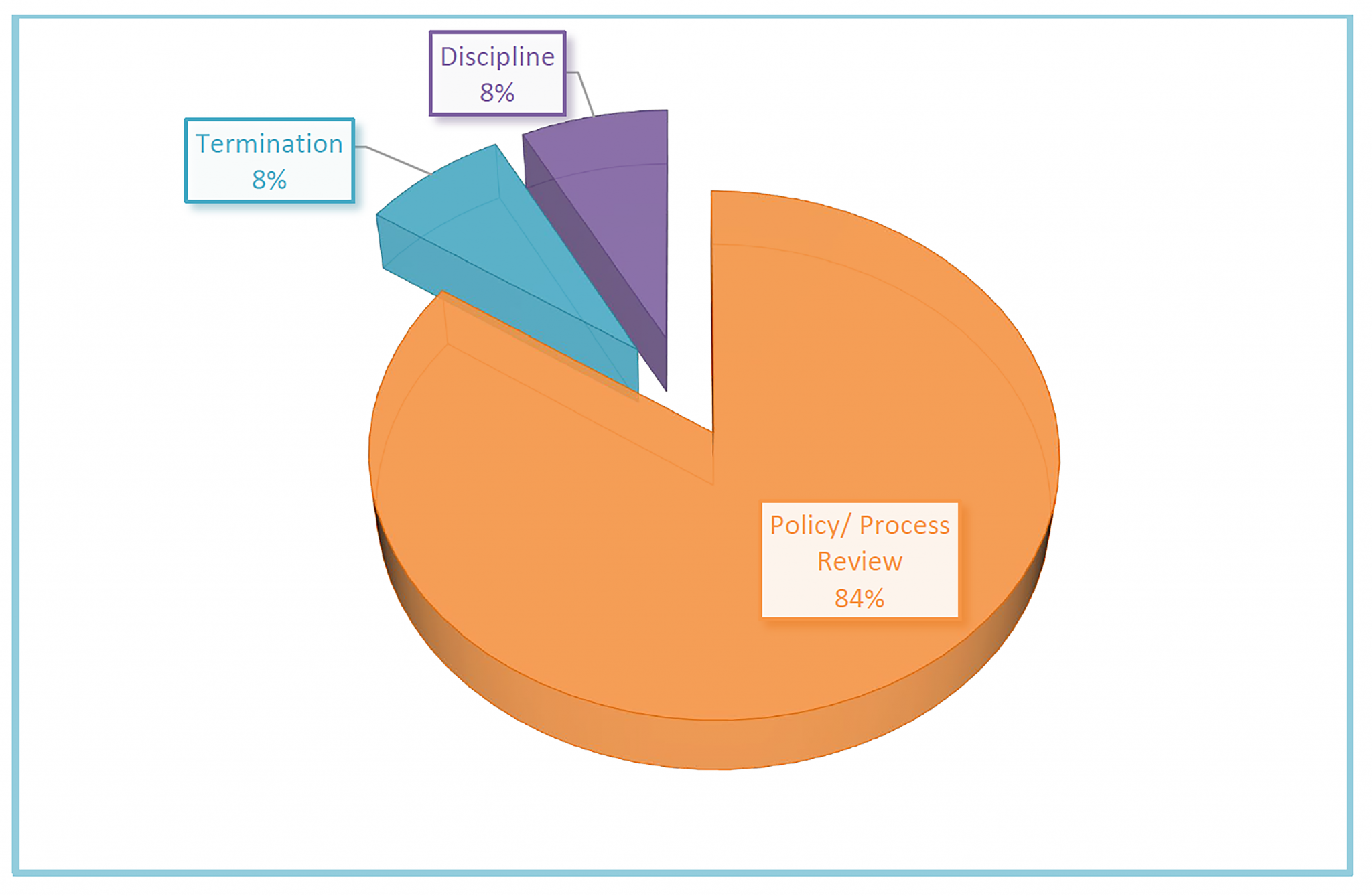

Unsubstantiated Cases
The remaining 56 investigations (12% of closed cases) conducted by University Compliance, Ethics, and Risk, University Audit or the Office of Institutional Equity yielded insufficient or no evidence to support that misconduct occurred and were closed with an unsubstantiated outcome. Despite the unsubstantiated finding, 17 of the cases resulted in recommendations for improvements such as a review in a policy, process, or training due to identified weaknesses.
Closed Cases – Referred, Insufficient Information, Frivolous
Three hundred and eighty-four cases (384) were not investigated by University Compliance, Ethics, and Risk, University Audit or the Office of Institutional Equity and were either referred out of the system or to another office, closed due to insufficient information or marked as frivolous.
Referred
A total of 347 cases (77% of all closed cases) were referred as follows:
-
- Two hundred and ten cases (210) were referred to the UCF Police Department, Student Conduct, or another college or department to address through the appropriate university process and closed out in the IntegrityLine system. These cases span the range of issues involving student misconduct such as alleged alcohol or drug abuse, grade disputes, COVID-19 policy violations, and interpersonal conflicts. Once the report is referred to the appropriate office, it is closed in the IntegrityLine system with a message posted back to the complainant.
-
- The remaining 137 cases were referred to a college or department to conduct an internal review and report back their findings.
Referred – Substantiated
Seventy-four (74) of the cases reviewed internally by a college or department resulted in a substantiated finding with the following issue types.
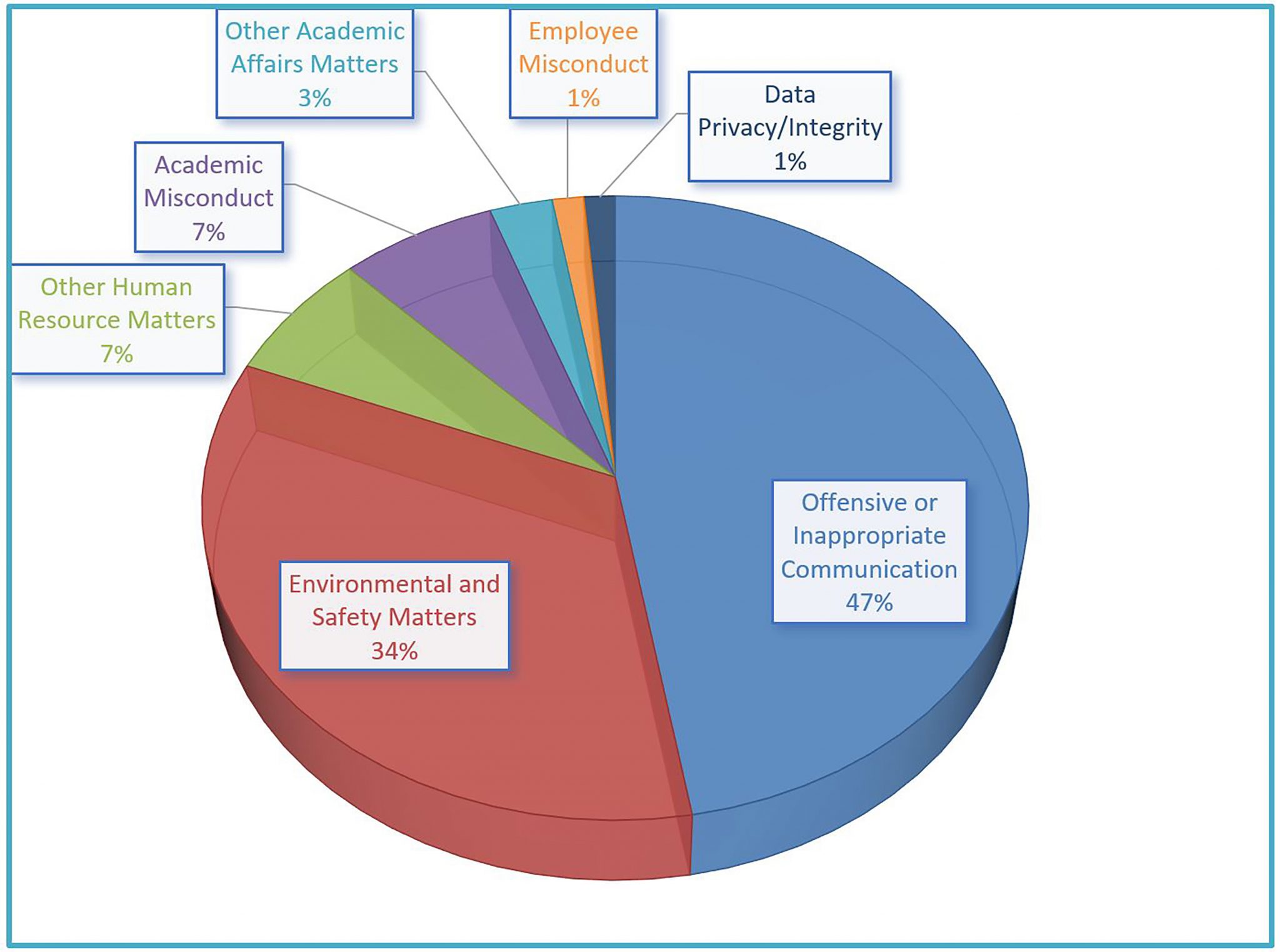

Referred – Substantiated – Action Taken
The actions taken for the 74 referred investigations that were substantiated were as follows:
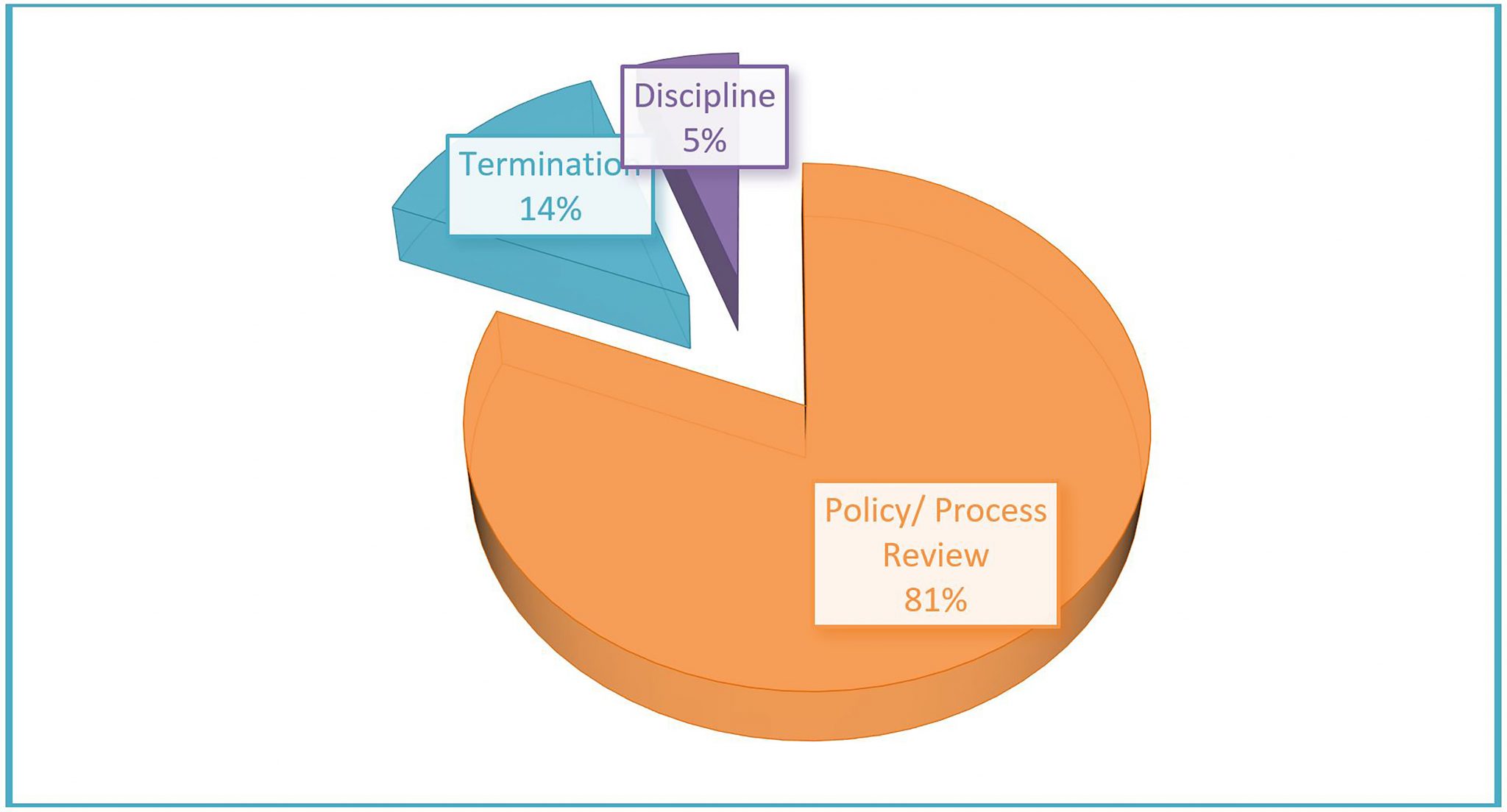

Referred – Unsubstantiated
The remaining 63 referred cases were unsubstantiated. However, 33 required improvements due to identified weaknesses which included policy or process reviews.
Insufficient Information
For 36 cases (8% of all closed cases), questions were posted to the reporter requesting additional information with no response. These cases were closed due to insufficient information.
Frivolous
One test case was submitted to evaluate system functionality, which resulted in removing an unnecessary question. This case was marked as frivolous and closed.
Trends Identified
The UCF IntegrityLine received an unprecedented number of reports in 2020. The significant increase in reports this year was largely attributed to the pandemic and the Armor Up awareness campaign which advertised the IntegrityLine as a mechanism to report allegations of non-compliance with the COVID-19 emergency policies. Also, in 2020 the university promoted the IntegrityLine for reporting allegations of non-compliance with UCF 2-004 Prohibition of Discrimination, Harassment and Related Interpersonal Violence Policy. As a result of these additional awareness campaigns, the highest number of reports submitted were those categorized as Environmental and Safety Matters with 251 reports representing 41% of all reports submitted. With 138 reports, representing 23% of all reports submitted, the second highest reported issue type was Discrimination or Harassment.
The third highest number of reports made to the IntegrityLine in 2020 were categorized as Offensive or Inappropriate Communication with 88 reports representing 14% of all reports submitted. This issue type includes concerns related to inflammatory, derogatory, unduly critical, or insulting communication and failure to treat one another with respect in accordance with the UCF Ethical Standards outlined in the UCF Employee Code of Conduct. In 2019, the office identified a trend of increased reporting and substantiated cases of Offensive or Inappropriate Communications. In response the office committed to evaluating the results of the 2020 Ethical Culture and Compliance Perception Survey while monitoring the IntegrityLine reports received that contained this issue type.
During 2020 the IntegrityLine continued to receive reports of Offensive or Inappropriate Communications and the results of the culture survey supported the need for the university to develop a strategy for improving respectful interactions in the workplace. In collaboration with Human Resources, the office developed a communication, education, and awareness campaign to address civility in the workplace. Since the initiation of the project, the following actions have been taken:
-
- Human Resources delivered workshops titled Civility at Work (non-supervisors) and Fostering a Civil Workplace (supervisors) with the following completions:
- Supervisors – 116
- Non-Supervisors – 131
- Human Resources delivered workshops titled Civility at Work (non-supervisors) and Fostering a Civil Workplace (supervisors) with the following completions:
-
- University Compliance, Ethics, and Risk
- developed a brief training titled Civility in the Workplace for all employees during Compliance and Ethics Week and promoted the Human Resources civility workshops
- added a module titled Respecting Others to the annual Code of Conduct training that is required of all non-student employees that is scheduled to launch on September 13, 2021
- University Compliance, Ethics, and Risk
Additional communication and training will occur during FY 2021-22.